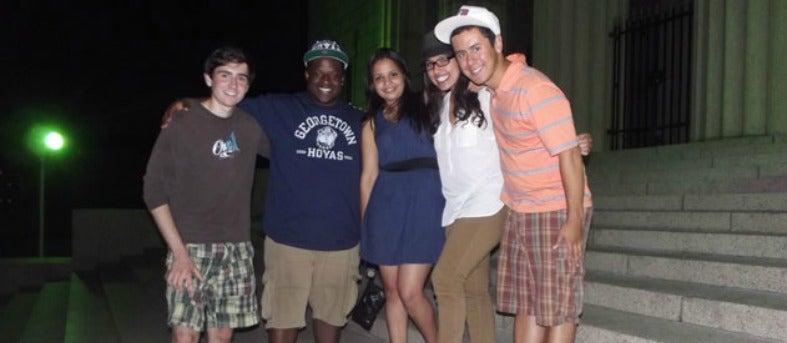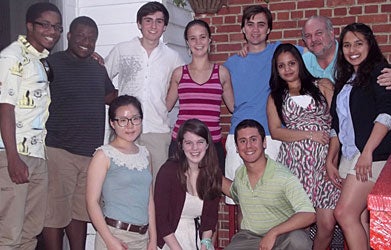Title: Summer Internships Supported by Student Government Association
The GUSA Summer Fellows program provides undergraduate students qualifying for need-based financial aid with complimentary housing on campus while they work in an internship or research site in Washington, D.C.

Collin Segura (C’15), who spent this summer working at the Library of Congress, says his internship would not have been possible if it weren’t for the Georgetown University Student Association’s Summer Fellows Program.
Segura, who analyzed Haitian literature and environmental history at the library’s John W. Kluge Research Center, was one of 11 Georgetown students participating in this year’s program.
The program provides undergraduate students qualifying for need-based financial aid with complimentary housing on campus while they work in an internship or research site in Washington, D.C.
Competitive Program
“My internship at the Library of Congress involved a lot of reading, mostly of monographs and articles,” Segura says. “I was particularly happy about being allowed to look at important Haitian novels for environmental themes, as literature is the focus of my major. Besides reading, I also was asked to look at photos, DVDs, videocassettes and film reels in the library’s collection.”
The application process for the fellowships is competitive, with financial need and academic merit playing key factors as well as whether the internship is likely to help students in their career path.
The program, which completed its fifth year on Aug. 5, has evolved over time to include more social outings, reflections and meet-and-greets with Georgetown faculty and staff to complement the participants’ internship experience.
Service, Meetings and Fun

Second right, Scott Fleming, Georgetown associate vice president for federal relations, poses with the GUSA Summer Fellows during a barbecue he hosted for the participants. Clara Gustafson (SFS’13), GUSA president, back center, joined the fellows at the outing.
“We’re looking more at service, we’re looking more at questions of who are you, what are you called to do,” says Justin Pinn (C’13), the program’s director. “Those are some of the questions I pose to a lot of fellows.”
Events this summer included dinner reflections, and meet-and-greets with Rev. Kevin O’Brien, S.J., vice president for Mission and Ministry; Rev. Raymond Kemp of Woodstock Theological Seminary and Sarah Stiles, visiting assistant professor of sociology.
They also took a trip to Six Flags America in Maryland.
Pinn, the GUSA secretary of diversity affairs, says one of the goals for the events was to get the fellows to learn more about one another’s backgrounds.
“What I tried to do was … [show] that we all come from different walks of life and we should all have the opportunity to learn from each other and we’ve focused a lot of our discussions based on that,” he says.
Participants in the program say they enjoyed their internship experience and bonding with their peers.
“My GUSA Summer Fellow experience has been rewarding both professionally and personally,” says Alejandro Zendejas (SFS’14), an international politics major who worked in the Department of the Treasury’s Financial Crimes Enforcement Network.
Better Trailblazers
This summer has been one of the best summers I’ve had and it has convinced me to think of a future in D.C.”
—Marta Aparicio (C’14), GUSA Summer Fellows Participant
Marta Aparicio (C’14), who worked in the office of Rep. David Cicilline (D-RI), says she was able to accomplish her goals of networking, making new friends and learning more about the U.S. government.
“This summer has been one of the best summers I’ve had and it has convinced me to think of a future in D.C.,” she says.
Pinn believes the success of the program this year is thanks to the support of GUSA, the Georgetown Scholarship Program (GSP) and the Office of Financial Services.
Next year, he says, the Office of Student Financial Services will take over the program in order to build a sustainable program that will help future Georgetown students from a lower socioeconomic status achieve their dreams.
“I think this program is definitely helping people become better trailblazers,” Pinn says.